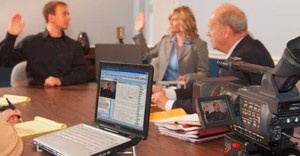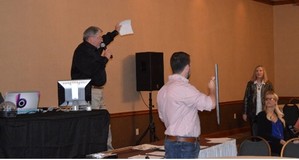At Oliver Law Firm, we handle cases from all over the country. That means lots of travelling, lots of plane tickets, lots of hotel rooms… and lots of money. One of the ways that we cut down on these litigation expenses is by conducting “remote depositions.” That doesn’t mean we use a remote control, it means we stay at our office and use all of this wonderful technology our modern lives provide to interact with the witness in a room hundreds or even thousands of miles away. While this does lose the “personal connection” part of a deposition, it’s a very effective way to move a case along for a fraction of the cost.
Often we get asked about how to use normal deposition tools and tactics through these electronic mediums. How do we use documents with the witness? How do we read body language? How do we make sure the other attorney isn’t improperly communicating with the witness? These answers are all much simpler than they appear.
For documents, it just takes some early preparation. If you have local counsel who’ll be appearing in person, then you can just get the documents together a couple days before and email them to the local counsel to print off and bring into the room. If there is no local counsel, the deposition prep needs to be done at least a week before the deposition. Then the documents can be emailed or faxed to the court reporter for them to bring with them. One thing to remember is to make sure all the pages you send are numbered so that you can easily tell the witness where you want to look.
Reading body language can be a little trickier. The only way to really do this is to have a full video-conference set up. The most fool-proof way to set up a video conference is to hire a company to set it up. This usually costs about $75/hour, but that is still significantly less than most plane tickets & hotel rooms. If you want to keep it really cheap, or maybe even free, Skype is a great program to use. You just need someone to set up a laptop or tablet at the destination and you can see everything that’s going on. You can even turn off the camera that faces you so that you can see the witness but they can’t see you. Sometimes this gets the witness to let their guard down and they forget that people are watching them. Most importantly, always have the depositions videoed (we use Arkansas Realtime Reporting for local cases) so that you can go back and look at how the witness acted during different parts of the deposition without relying on your memory. If a deposition isn’t worth videoing, it isn’t worth taking.
Finally, video conferencing is also the best way to ensure that no improper communication is going on between the witness and their insurance defense attorney. The key tip is to talk with the videographer before the deposition takes place. In most states, the videographer is allowed to move the camera and focus on different people if something relevant is happening. Make it clear with the videographer that you want him or her to capture any communication between the witness and their lawyer so that it can be reviewed after the deposition. If you’re video conferencing, have the camera set up so that you can see both the witness and opposing counsel and simply call them out any time they try to improperly communicate.
Litigation expenses end up coming straight out of whatever recovery your client receives, so it can be very important to keep these costs down. One of the easiest and most efficient ways to do this is through taking remote depositions. Using these tips, your remote depositions will be just as successful as your in person ones.
a Free Consultation




